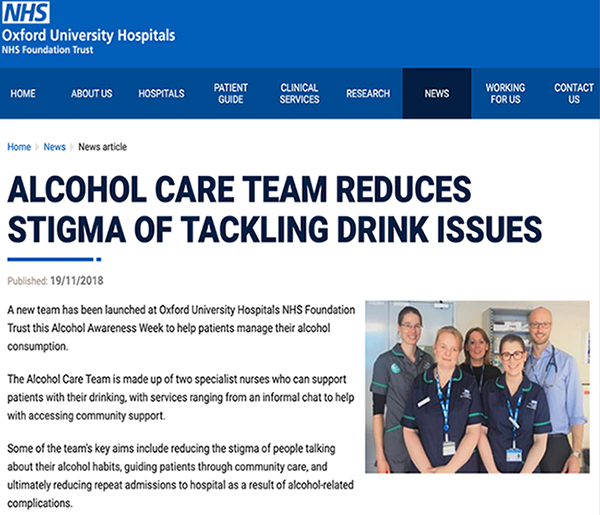Mental Health
Role for MDT Alcohol Care Teams in addressing alcohol crisis explored

Current service provision for alcohol services in Ireland is fragmented and a more joined up approach may be a better way to yield results as clinicians urge MDT approach
Almost 200 people attended a recent online meeting to address the alcohol crisis in Ireland, organised by Prof John Ryan, Consultant Hepatologist at Beaumont Hospital, Dublin, and Associate Professor at the Royal College of Surgeons in Ireland (RCSI).
Prof Ryan was joined by colleagues Prof Siobhan MacHale, Consultant Psychiatrist at Beaumont Hospital and Dr Hugh Gallagher, GP Co-ordinator in the Health Service Executive (HSE) Addiction Service in Dublin North City & County.
Prof Ryan began by outlining that current service provision for alcohol services in Ireland is fragmented and that a more joined up approach may be a better way to yield results.
Ireland has the fifth highest rate of alcohol-related harm in Europe1 at a huge cost to the health service.1 Data for Beaumont Hospital alone shows that in 2018/19 between eight to 11 per cent of Emergency Department presentations and 17 per cent of Intensive Care Unit (ICU) admissions are alcohol-related.
Alcohol-related inpatient admissions in the same time period equated to 9,664 bed days at a minimum cost of €8,146,752, and neurosurgery alcohol related admissions alone equated to a cost of over €834,000.
Moving on to the burden of alcohol across all of Ireland, Prof Ryan underlined a series of “stark facts” including a consistent trend in increasing rates of liver disease across all age groups from aged 15 upwards; mortality from liver disease has increased 400-fold since 1970; 452 per cent increase in liver deaths seen between 1971 and 2012; 54 per cent of people who drink in Ireland drink in a harmful manner.
Looking at the impact of Covid-19 on spending habits, the areas that saw the most dramatic increase were online shopping and alcohol.2 The impact of the latter will continue to add to already overstretched resources.
Prof Ryan queried what the solution might be and offered one potential answer to addressing the burden on the health service in Ireland by the creation of Alcohol Care Teams (ACTs).
He described a model for an Acute Hospital Alcohol Care Team which would be consultant-led, multidisciplinary and patient-centred and can be integrated across primary and secondary care.
A seven-day alcohol specialist nurse service along with co-ordinated policies for the emergency department and acute medical units is the gold standard for such a team.
Stakeholder engagement from public health is key to the success of an ACT. Clear financial benefits from ACTs have been published.3 Prof Ryan mentioned his role in developing an Alcohol Care Team in Oxford University Hospitals Trust in the UK in 2018 and his desire to see the same teams created across Ireland, adding “We are stronger together” and that a true multidisciplinary approach was required.
His colleague, Prof MacHale, with over 25 year’s experience in Liaison Psychiatry was instrumental in overseeing of the introduction of one of Ireland’s first Alcohol Liaison Nurses, Liz Gilligan.
Underscoring that alcohol-related issues are part and parcel of all acute hospital healthcare professionals’ daily work, she presented data that shows alcohol abuse is frequently undetected and mismanaged in the general hospital setting.
Patients referred to Liaison Psychiatry or Addiction Services tend to have severe chronic alcohol dependence, problems with management of withdrawal symptoms and are often behaviourally disturbed.
Prof MacHale stressed the importance of early diagnosis and referenced survival rates of cancer being so much higher when cancer is detected early4 and the same need to diagnose alcohol misuse as early as possible, where the evidence base for successful outcomes is much higher, with lower costs, than for patients with established dependence.
Early signs of alcohol problems can be associated with presentations such as minor injuries, gastritis, hypertension and self-harm, while later presentation of dependent drinking is more likely in patients with cirrhosis and liver failure.
She outlined local findings over a 10-year period (2005-15) including: a three-fold increase in alcohol-related presentations to Beaumont Hospital Emergency Department; 35 per cent increase in alcohol-related length of stay in Beaumont Hospital, while the overall length of stay was decreasing, and a 500 per cent increase in alcohol-related number of bed days, due to a combination of increased number of presentations and increased length of stay.
The role of Alcohol Care Teams as a potential solution across Ireland was also addressed by Prof MacHale. Their function would include:5 screening for alcohol misuse; delivering brief interventions/advice; facilitate timely safe detox and discharge; maintain abstinence; harm reduction; pre-empt the need for admission; develop clinics for frequent attenders; link to community support; education and training of staff.
National data6 in Britain shows that for every pound the UK National Health Service (NHS) invests, they save £3 to £4 (€3.40 to €4.50) for dependent drinkers and between £3.81 to £10 (€4.30 to €11.30) for hazardous drinkers demonstrating the need for early identification and treatment. Data7 has shown that ACTS are effective in: reducing Emergency Department (ED) attendances by up to 60 per cent; reducing hospital admissions by 66 per cent; reducing length of stay from 11.5 days to 8.9 days; improving patient care with clinical incidents reduced by 75 per cent; providing safer more effective withdrawal treatment and UK data has shown savings of between £140,000 and £300,000 (€158,000 to €340,000) over a three to 12-month period.
The Alcohol Liaison Nurse (ALN) service was established as a half-time post in Beaumont Hospital on receipt of the Denis McCarthy Bursary award from the Beaumont Hospital Foundation of €75,000 in 2008. Due to the successful impact of this post, it was increased to a full-time post, funded by Beaumont Hospital, in 2012. The demand for such a service has increased year on year, with 700 to 800 inpatient referrals seen annually in recent years.
Within the first six months of the 0.5 ALN in post, despite a 36 per cent increase in alcohol dependency-related admissions, the impact of the ALN resulted in a 35 per cent reduction in associated length of stay and 12.4 per cent reduction in bed days used, yielding a cost saving of €313,120.

Despite an 18 per cent increase in alcohol intoxication-related admissions, there was a 28 per cent reduction in associated length of stay and 15 per cent reduction in bed days used, yielding a cost saving of €62,601. There were also other clear benefits such as improved assessments of patients, education of medical and nursing staff and increased prescribing of IV thiamine.
Prof MacHale highlighted a single Beaumont Hospital alcohol-related admission of 14 months that cost €761,300 in bed days and cost of 1:1 specials, excluding other costs such as occupational therapy and physiotherapy input. This cost equates to the annual salary cost of 25 nurses.
Looking ahead, Prof MacHale urged the setting up of an Alcohol Care Team in every hospital in the country, with a consultant-led, multidisciplinary team integrated across primary and secondary care.
Dr Gallagher, GP Co-ordinator for Substance Misuse in Primary Care, echoed the need for a team approach across primary and secondary care. He stated that there are 150,000 alcohol-dependent people in Ireland which equates to approximately 60 patients per general practitioner (GP).
There are barriers quoted in primary care such as lack of time, relevant knowledge and skills, resources and support and perceptions about “hard to cure” patients and negative stereotypical views of people that are alcohol-dependant.
However, there are great opportunities to make a difference in patient care through screening. Screening can happen in so many commonplace interactions in primary care.
Dr Gallagher identified opportunities for screening, such as for new patients to the practice; built into reviews of cardiovascular disease, diabetes, employment/insurance screening requests for sick certificates as well as simple opportunistic screening and that patients expect and, in most cases, are happy to be asked about their drinking habits.
He reiterated Government guidelines for low-risk drinking in Ireland of 11 standard doses a week for women and 17 standard doses for men, spread over three or more days and incorporating several alcohol-free days each week.
The use of the simple AUDIT9 questionnaire is a quick and effective way to identify those at risk of hazardous, harmful and dependent drinking and allows for relevant interventions to take place in a timely, effective way.
Engagement with patients is key when discussing their alcohol use requiring empathy, prompt intervention, networking and case management with holistic continued care, he added.
Keen to develop a multidisciplinary approach across Ireland, beginning with the creation of Alcohol Care Teams, Prof Ryan concluded by adding that he would like to hear from people interested in developing services across Ireland and can be contacted on: alcoholservice@beaumont.ie.
The educational meeting that this report is based upon was funded by Kyowa Kirin Ltd as a service to medicine. Kyowa Kirin has had no influence in the content of the presentations except to review for accuracy and to ensure compliance with pharmaceutical industry regulatory requirements. ![]()
KKI/IRE/NPR/0003. Date of Preparation January 2021.
References
- Mongan D & Long J, HRB 2016 alcoholireland.ie.
- Hacioglu S et al CEPR 2020
- Williams R et al., The Lancet Liver Commission 2014; NICE 2011/2016; https://fg.bmj.com/content/flgastro/early/2019/08/14/flgastro-2019-101241.full.pdf.
- Cancer Research UK 2018.
- Crawford MJ. et al, The Lancet 2004.
- Ryder S et al., Clin Med 2010; Liverpool Public Health Observatory 2010.
- Hughes NR Front Gastro 2013; NCEPOD report 2013; Williams R et al., The Lancet Liver Commission 2014; Ryder S et al., Clin Med 2010; PHE 2014.
- www2.hse.ie/wellbeing/alcohol/improve-your-health/weekly-low-risk-alcohol-guidelines.html.
- Bush K, Kivlahan DR, McDonell MB, et al. The AUIDIT Alcohol Consumption Questions (AUDIT-C). Arch Intern Med. 1998 Sep 14;158(16):1789-95.
-

 Destination8 months ago
Destination8 months agoSingapore Airlines CEO set to join board of Air India, BA News, BA
-

 Breaking News10 months ago
Breaking News10 months agoCroatia to reintroduce compulsory military draft as regional tensions soar
-

 Gadgets3 months ago
Gadgets3 months agoSupernatural Season 16 Revival News, Cast, Plot and Release Date
-

 Tech News12 months ago
Tech News12 months agoBangladeshi police agents accused of selling citizens’ personal information on Telegram
-

 Productivity11 months ago
Productivity11 months agoHow Your Contact Center Can Become A Customer Engagement Center
-

 Gadgets3 weeks ago
Gadgets3 weeks agoFallout Season 2 Potential Release Date, Cast, Plot and News
-

 Breaking News10 months ago
Breaking News10 months agoBangladesh crisis: Refaat Ahmed sworn in as Bangladesh’s new chief justice
-

 Toys12 months ago
Toys12 months ago15 of the Best Trike & Tricycles Mums Recommend























